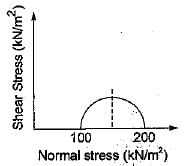Test: Shear Strength of Soil - 2 - Civil Engineering (CE) MCQ
10 Questions MCQ Test - Test: Shear Strength of Soil - 2
The ratio, of the undisturbed shear strength to the remoulded shear strength in cohesive soil under undrained conditions is
The unconfined compressive strength of a pure clay soil is 100 kN/m2. What is the value of cohesion of the soil in kN/m2?
Match List-I (Field test) with List-ll (Useful for) and select the correct answer using the codes given below the lists:
List-I
A. Vane shear test
B. Standard penetration test
C. Static cone penetration test
D. Pressure meter test
List-ll
1. End bearing and skin friction resistance
2. In-situ stress-strain characteristics
3. Soft clay
4. Sandy deposits
Codes:
A B C D
(a) 4 2 1 3
(b) 3 4 1 2
(c) 4 3 2 1
(d) 3 4 2 1
A vane 20 cm long and 10 cm in diameter was pressed into a soft marine play at the bottom of a bore hole. Torque was applied gradually and failure occurred at 1000 kg-cm. The cohesion of the clay in kg/cm2 is
The results of a consolidated drained tri-axial shear test on a normally consolidated clay are shown in Figure below:

The angle of internal friction is
A and B are Skempton’s pore pressure parameters and Δσ1 and Δσ3 are incremental principal stresses. Skempton’s pore pressure equation is given by
A cylindrical specimen of saturated soil failed under an axial vertical stress of 100 kN/m2 when it was laterally unconfined. The failure plane was inclined to the horizontal plane at an angle of 45°. The values of cohesion and angle of internal friction for the soil are respectively.
If the shearing stress is zero on two planes, then the angle between the two planes is
The state of stress on a plane inclined at an angle of 45° to the horizontal plane is represented on the Mohr’s circle by a point at which
























